This article is part of the Beginners Guide to Scuba Diving
Scuba diving is one of those activities that everyone says they want to do one day, but often never get the chance to experience. If you’re reading this right now, you are one of the lucky ones attempting to put their money where their mouths are and give scuba diving a try to explore the underwater world to explore unbelievable dive sites. But before you dive into deep waters or off dive boats, we must cover the basics of what recreational scuba diving is and how you can do it.
There are many ways to describe scuba diving. Some people think of it as a sport or lifestyle while others think of it as a tourism activity or a meditative experience. In general, you may think of scuba diving as an underwater experience. At its core, scuba diving is an activity where you dive underwater to experience the beauty and nature that lie beneath the ocean.
There are various aspects and sub-branches of what scuba diving entails. However, in this article, we will keep things simple, short, and easy to follow and tell you about recreational scuba diving. We will talk about the basics you need to know about scuba diving as a beginner. So, if you are new to the world of scuba diving, keep reading so that we can dive into all you need to know to get started.
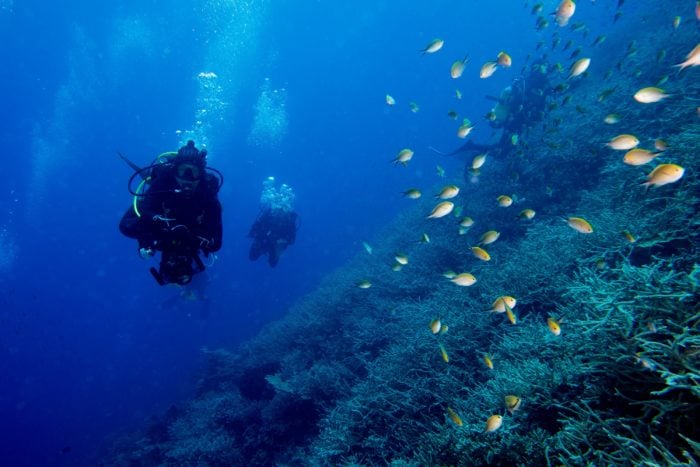
What Is Scuba Diving?
Scuba is a term that almost everyone has heard of. It is actually an acronym that stands for Self-Contained Underwater Breathing Apparatus.
Scuba diving as a sport is when a person dives underwater to explore the ocean. There are various types of scuba diving. However, for most people, scuba diving is an activity they do recreationally as tourists while on vacation or holiday. Recreational scuba diving often is done off dive boats to experience unbelievable dive sites. Recreational divers put on a scuba tank to breathe underwater to see the beauty of the ocean and interact with sea creatures.
Scuba diving is a common hobby among people of all ages. You may have heard how some people do yoga or Zumba to de-stress. Becoming a certified diver and going Scuba diving has become another meditative activity that many general people do to destress. The experience of being weightless and “flying” through the water while watching marine life, exploring spectacular reefs, underwater caves, or even diving into sunken wrecks is something unlike anything else in this world.
Many people also progress from being recreational divers to making scuba diving a profession or lifestyle. There are multiple types of professional Scuba diving careers including becoming a dive instructor or even a marine biologist or archaeologist to help with underwater research. As of yet, 80% of the ocean around the globe is still unmapped, and becoming a professional scuba diver allows you to help advance your knowledge of the underwater world.
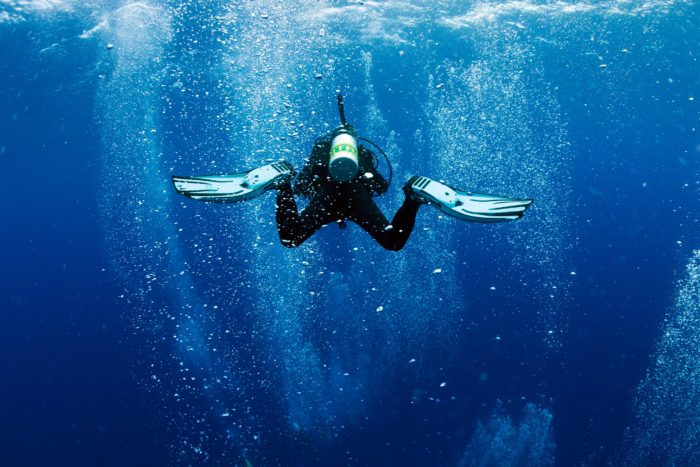
Is Recreational Scuba Diving Dangerous?
There are certain risks to scuba diving but ultimately it’s a very safe sport to enjoy. Millions of recreational divers go diving every year and there are very few accidents.
The primary rule any certified diver learns is to never dive alone. Always dive with a buddy, not only for safety but it’s always better to share the experience of experiencing unbelievable dive sites together.
You should research how to become a certified diver with a comprehensive diving program like PADI, NAUI, SSI, or BSAC. You should also research your scuba instructor, your dive school, and any dive locations you want to dive. Ultimately being prepared will make you a better diver.
If you are scuba diving as a tourist, there is very little risk involved. Recreational divers usually only travel in the safer parts of the ocean. Additionally, you will have an instructor or experienced divers (called divemasters) who will teach you everything you need to know before diving. You will not be allowed to go diving off dive boats or experience marine life on dive sites until you prove that you know all the basic moves and safety signals.
In the end, you are immersing yourself in an unbreathable liquid using equipment for life support and diving in an environment where wild creatures inhabit so like any activity you need to be a properly certified diver and respect the underwater world.
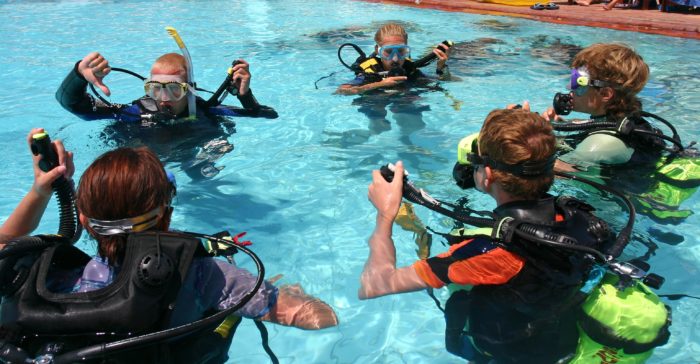
Do You Need A Certification To Scuba Dive?
Technically, it is not illegal to scuba dive without a certification. However, if you want to scuba dive safely, you will need to get certified by a scuba diving instructor. As previously mentioned. If you are recreational diving, you will need to train under an instructor. The instructor will give you lessons just like a regular class.
After the lessons, you will have to prove your knowledge by taking a test. If you pass the test, you will be certified as a beginner scuba diver. Almost every institution around the world will need you to show your license or certification before letting you dive into their premises or onto their dive boats. So, if you want to scuba dive properly, you need to have a scuba diving license.
In general, scuba diving isn’t something you can learn on your own. Even if you learn the principles of everything online, putting them to practice is a whole other issue. Thus, if you want to learn scuba diving properly, and get access to a wider territory, getting a scuba diving license is essential.
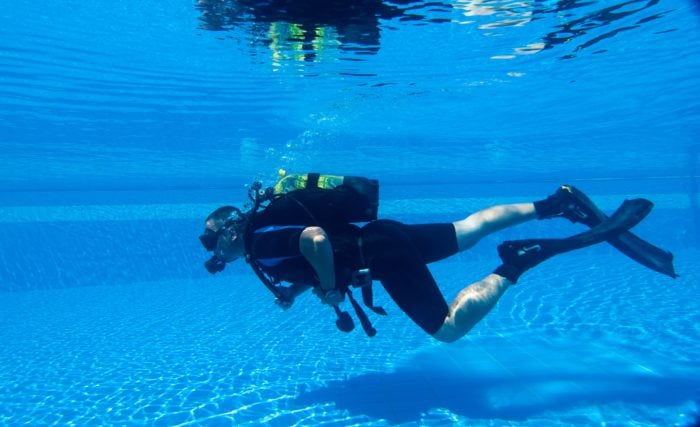
How To Get A Scuba Diving Certification?
To get a scuba diving certification, you need to enroll in a scuba diving class. Various agencies around the world offer scuba diving courses. If you complete these courses with positive results, you will receive a scuba diving certification. Some of the most popular scuba diving agencies include PADI, BSAC, SDI, NAUI, etc.
However, before getting a scuba diving certification you have to make sure you meet the physical requirements. In most places in the world, you have to be at least 12 years old to get scuba diving lessons – although there are some taster or discovery dive programs with most agencies starting from 8 years old.
You also cannot apply for a scuba diving certification if you have medical issues. Before starting any certification course, you need to fill out a medical form that declares you fit for diving, assuming you are. If you have some type of medical condition, you will need your doctor to sign off on it.
Aside from medical issues, almost anyone can enroll in scuba diving lessons. There are even special organizations that help disabled people learn how to scuba dive. Additionally, scuba diving certifications do not have any expiration dates. So, if you are certified once, you are certified for life. However, it is good to brush up on skills if you haven’t dived in a while as although it is like riding a bike it’s always better to get your skills refreshed.
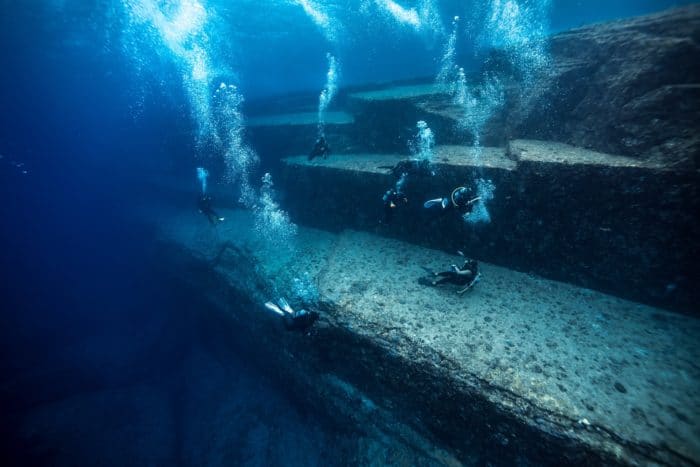
What To Expect From Scuba Diving Lessons?
Scuba diving lessons are pretty simple and uncomplicated. For recreational diving, you can receive a beginner’s certification – like PADI Open Water – in three to four days after completing the lessons often taught at the dive shop. If you are traveling you can do something called a “referral” where you complete your theory training and exam online or via a local dive shop, then you do your pool training and open water dives at your destination.
However, in more advanced courses, it can take four to six months for you to receive a scuba diving certification. Since the skills taught in advanced courses are more difficult, it takes longer to get certified.
In a beginner’s scuba diving class, you will learn the basics of scuba diving. Most of your lessons will be about planning your dive, and using your underwater breathing apparatus and other equipment properly. You will also learn the techniques, procedures, and safety drills for simple dives as well as basic underwater hand gestures. Additionally, you will also receive some physical training by diving in a swimming pool or shallow waters.
A beginner’s scuba diving class won’t complicate things with technical jargon. The main focus will be on safety protocols. For instance, what to do if you run out of air, and how to control your buoyancy in the water. Or, how to tell your instructor that you need help. So, if you’re a beginner diver, rest assured that the initial courses will be easy and guarantee your safety.
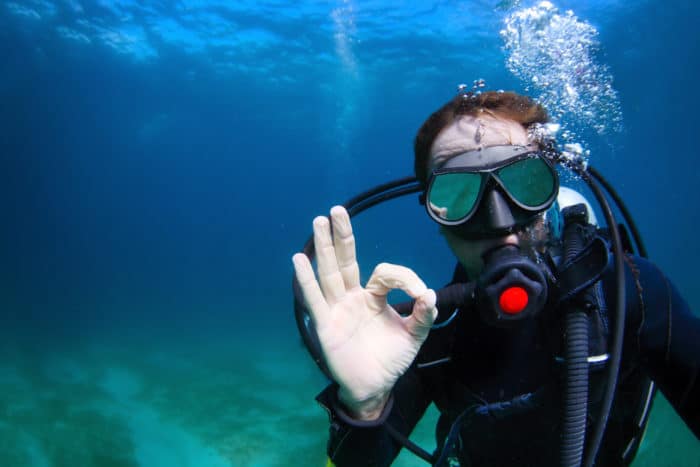
Tips for Staying Safe while Scuba Diving
Here are some tips that can help you enjoy your dives while staying safe while scuba diving.
- Ensure that all components of your diving equipment are in good working condition before you embark on a dive. If you discover any problem with the equipment, don’t use it and inform your instructor immediately. Any scuba equipment that has been tampered with or is faulty should not be used for scuba diving.
- Never hold your breath underwater while diving because many people instinctively do this. Even if you are an experienced diver, you could get into trouble if you hold your breath underwater.
- Diving more than 30m/100ft below sea level can cause the nitrogen in the air to affect your body, because of which you might experience a ‘bends’ situation where nitrogen bubbles start appearing in your blood and joints. This is a serious condition that requires immediate medical attention.
- Never go on a dive if you feel sick, have a fever or a cold. Many people often ignore their symptoms and end up going scuba diving, but this is a very dangerous thing to do as it can lead to further complications such as a ruptured eardrum.
- Never panic underwater because this will only make the situation much worse. Panicking is common among untrained divers who are trying to ascend too quickly.
- Don’t dive alone if you are not an experienced scuba diver because there might be problems that you may not deal with on your own. So, diving should always be done during a buddy dive or in pair of divers.
- Never go on a night dive without proper training because it is very dangerous, and you could lose your way in the dark if you are not adequately equipped with navigation gears.
How to Get Started With Scuba Diving
People of all ages and sizes may learn to scuba dive safely due to technological developments in diving equipment, medicine, and training. scuba diving is possible for the majority of individuals who have a basic level of physical fitness and feel comfortable in the water.
Choose a Scuba Diving Course
Different diving courses are available like open water certification, advanced open water certification, rescue diver courses, etc. These can be completed by anyone ready to take up the challenge. Even people with no previous experience in scuba can undertake these certifications and become certified divers within a short period.
Buy or Rent Dive Gear
You can rent or buy equipment, which makes it more feasible for your budget.
Enroll in a Scuba Diving Course
Typically, this type of training is conducted in groups, but you can go in solo if you prefer—several scuba diving certification organizations to choose from like PADI, NAUI, BSAC, etc.
Learn Essential Dive Theory
Theory classes teach you about diving equipment, physiology, decompression calculations, and dives. You will also learn to deal with dive emergencies like running low on air or getting lost underwater.
Practice Simple Skills With an Instructor
You can practice beginner skills with an instructor to get a good grip on the basics. You need to pass a few simple tests before going in for your first scuba dive.
Go On Your First Dive
Your first-ever dive is something that you will never forget! After passing all the tests, you will go for a drive along with your instructor. Several scuba diving certification agencies ensure that you get the most out of your time and money invested in this course.
You will be certified as an open water diver when completed the training process
Are you ready to become a Scuba Diver and explore the underwater world?
Scuba diving is a fun activity that can help you destress and momentarily escape from your mundane life. Though there are minor risks involved, they can be easily overcome through proper training and getting a scuba diving certification.
We hope this article helped you learn the basics of scuba diving. Now that you know the fundamentals, we hope you will continue your journey and give scuba diving a try.
Click here for more articles in the Beginners Guide to Scuba Diving
Brought To You By
Our Beginners Guide to Scuba Diving is brought to you by Pearl Fleet. Pearl Fleet invites you to embark on their exquisitely crafted yachts for the finest diving experience the world has to offer. From purposefully designed diving itineraries to high-class amenities, Pearl Fleet’s immersive getaways allow you to indulge in your passion as you journey to world-class diving destinations. You can find out more at pearlfleet.org.


